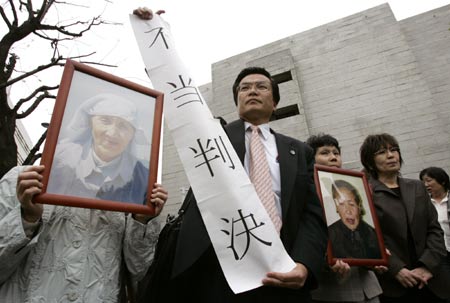China blasts Japan court's rejection on WW2 suits
(Xinhua)Updated: 2007-04-28 08:55
BEIJING -- China on Friday denounced the Japanese Supreme Court's interpretation of the Chinese government's waiving its right to war reparations, which was declared in the Sino-Japanese Joint Statement, as "illegal and invalid".
Chinese Foreign Ministry spokesman Liu Jianchao made the remarks when asked to comment on the Japanese Supreme Court's rejection of a damage lawsuit filed by former Chinese laborers who were forced to work in Japan during World War II.
The top court's final ruling on Friday rejected the demands of the five plaintiffs that Tokyo-based construction contractor Nishimatsu Construction Co. apologize and issue compensation.
The court said that Chinese individuals had no right to demand war reparations from Japan.
Liu said the Chinese government's declaration in the Sino-Japanese Joint Statement on waiving the right for war compensations from Japan was a political decision made out of an aim to help the two peoples coexist in amity.
Liu noted the Japanese court had once again disregarded the solemn representations lodged by China, and China strongly opposed the arbitrary interpretations of this article of the joint statement.
Liu pointed out that Japan's actions to force and enslave the Chinese during World War II were serious militaristic crimes as well as a realistic and grave human rights issue that has not yet been resolved.
"We have already asked the Japanese government to seriously deal with China's concerns and properly handle this issue," said Liu.
The lawsuit was filed in 1998 by Shao Yicheng, Song Yicheng and three families of the deceased laborers, who were among some 360 Chinese forced by Nishimatsu Construction to labor under severe conditions at a work camp in Hiroshima prefecture in southern Japan during World War II.
| |||
The Supreme Court's ruling, however, recognized the suffering of the forced laborers and called on "concerned people to make efforts to provide relief to the victims".
Among those forced to Japan by Nishimatsu in 1944, 29 laborers died either of torture or on the ship back to China when Japan was defeated in 1945.
In 1998, the five plaintiffs demanded Nishimatsu apologize and pay damages of 5.5 million yen (46,760 U.S. dollars) for each.
The High Court of west Japan's Hiroshima prefecture awarded damages in full to the five plaintiffs in July 2004, marking the first time a Japan high court has ordered the defendant in a series of lawsuits involving forced laborers to pay damages to the plaintiffs.
However, Nishimatsu did not accept the ruling and appealed to the Supreme Court for the final ruling.
|
||
|
||
|
|


